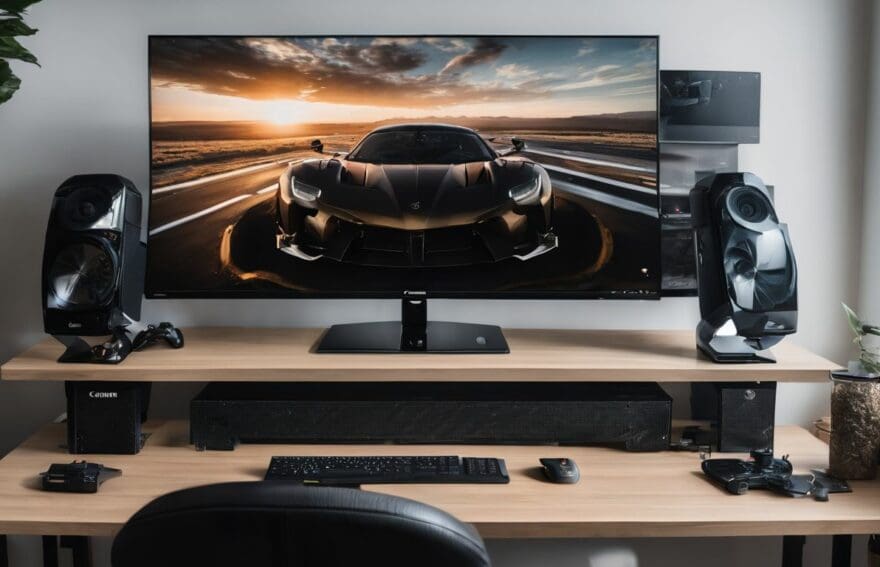Balancing Act: The Esports Athlete’s Guide to Managing Game Time and Real Life

Updated On: October 24, 2025 by Aaron Connolly
Navigating the delicate dance of game time management can feel as formidable as facing down the final boss for esports enthusiasts. Rest assured, you’re not alone in this tussle. Just like you, we grapple with striking that perfect harmony between our devotion to gaming and the everyday demands life throws at us; it’s quite telling that an eye-opening 48% of gamers across certain regions cite juggling their time as a significant hurdle.
Our carefully curated insights and strategies are here to offer you that essential balance, guaranteeing that you shine just as brightly outside the virtual world as you do within it.
So come along on this journey for your quintessential guide to achieving victories in real life!
Understanding Esports and Its Growing Popularity
In recent years, we’ve witnessed esports explode onto the global stage, transforming from niche pastimes to major sporting events. Professional video gaming now draws in massive audiences both online and at live venues, with fans cheering wildly for their favourite teams and players.
Competitions are no longer informal gatherings; they’re high-stakes tournaments where elite athletes battle it out for glory and hefty prize money. This surge is more than just a trend; it reflects a shift in entertainment preferences and the emergence of new digital arenas.
We see gamers evolving into celebrated figures within the esports industry, much like traditional sports stars. They dedicate countless hours to perfecting their craft, adopting rigorous training regimes that go beyond mere gameplay to include physical activity and mental health strategies—a true balancing act between keyboard agility and overall wellness.
As spectators eagerly watch these virtual battles unfold, they’re not just following games; they’re engrossed in storylines of perseverance, teamwork, adversity overcome—elements that resonate deeply with fans across the globe.
The Importance of Balancing Gaming and Real Life
Balancing gaming and real life is crucial for the overall well-being of esports athletes. Developing time management skills and self-regulation strategies can help players maintain a healthy balance between their virtual world and real-life responsibilities.
Time Management Skills
Developing effective time management skills is crucial for esports athletes. Setting clear priorities and creating a schedule can help in balancing gaming and real-life responsibilities.
Taking regular breaks and staying active, even within the game or during downtime, can contribute to better mental and physical health.
Esports athletes can also benefit from transferable skills such as problem-solving, teamwork, and strategic planning that are honed through gaming. Applying these skills to real-life scenarios improves overall performance and stress management.
Self-Regulation Strategies
Esports athletes can benefit from self-regulation strategies to maintain a healthy balance between gaming and real life. Setting specific time limits for gaming sessions, taking regular breaks, and prioritising other responsibilities are effective ways to regulate game time.
By incorporating these strategies into their routine, esports athletes can enhance their overall well-being while continuing to excel in their gaming pursuits.
Moreover, practising mindfulness techniques such as deep breathing exercises and meditation can contribute to improved focus and cognitive abilities during gaming sessions. Additionally, staying physically active through regular exercise not only promotes physical health but also supports mental wellness.
These strategies enable gamers to enjoy the benefits of esports while managing real-life commitments without feeling overwhelmed or stressed.
Real-Life Success Stories of Esports Athletes
Many professional gamers have leveraged their skills and experiences from the esports world to achieve success in real life. Here are some inspiring examples:
- A former pro-gamer used his strategic planning expertise to excel as a successful entrepreneur, launching a thriving tech start-up.
- An esports athlete honed his teamwork and communication skills to transition into a leadership role at a major marketing firm, driving innovative campaigns.
- Drawing on problem – solving abilities developed through gaming, a retired esports player seamlessly pivoted into a rewarding career in IT security.
- Leveraging the discipline and determination cultivated during his gaming career, a former esports competitor thrived as a fitness coach, inspiring others through physical training and motivation.
- An ex – professional gamer effectively applied his time management skills to become an acclaimed author, achieving bestseller status with his debut novel.
Tips for Balancing Gaming and Real Life
Prioritise your tasks and allocate specific time for gaming and real-life activities, create a schedule to maintain balance, and remember to take regular breaks and stay active. If you want to learn more about how to manage game time and real life as an esports athlete, keep reading!
Setting Priorities
Setting priorities is essential for maintaining a healthy balance between gaming and real life. By identifying the most important tasks and commitments, gamers can allocate their time effectively to ensure they meet both their gaming goals and responsibilities in the real world.
This involves recognising which activities are crucial for personal growth, such as health promotion through regular exercise or developing coping skills to maintain mental well-being.
Prioritising these aspects can help gamers achieve success not only in esports but also in their overall quality of life.
Creating a Schedule
To maintain a healthy balance between gaming and real life, creating a schedule is crucial. This allows us to allocate dedicated time for esports while ensuring that we also have time for other aspects of our lives.
By setting specific time slots for gaming and adhering to them, we can better manage our responsibilities and commitments outside of the virtual world.
Esports athletes can benefit from incorporating regular breaks into their schedules, promoting physical activity and mental relaxation. By establishing a consistent routine that includes sufficient rest periods and opportunities for exercise, gamers can enhance their overall well-being while maintaining their competitive edge.
Taking Breaks and Staying Active
To maintain our physical and mental well-being while gaming, it’s crucial to take regular breaks and stay active. Incorporating short breaks every hour to stretch, walk around, or do simple exercises can help prevent eye strain, improve circulation, and reduce the risk of muscular discomfort.
Additionally, engaging in physical activities outside of gaming, such as walking, jogging or even participating in other sports, can contribute to enhancing overall fitness levels and mental clarity.
It’s important to strike a balance between gaming time and physical activity to promote a healthier lifestyle as an esports athlete.
Developing Transferable Skills from Esports to Real Life
By participating in esports, players have the opportunity to develop transferable skills that can be applied to real life. These include problem-solving skills, teamwork and strategic planning.
Problem-Solving Skills
Developing strong problem-solving skills is a crucial aspect of excelling in esports and professional gaming. This capability enables gamers to analyse complex situations, strategise effectively, and make quick decisions under pressure.
By honing these skills in the gaming environment, players can seamlessly transfer them into real-life scenarios. Problem-solving abilities acquired through esports can be invaluable for navigating challenges at work, school, or personal endeavours.
Additionally, adapting these skills outside of the gaming realm allows for creative thinking and innovative solutions to everyday problems.
Teamwork
Teamwork is a crucial skill in both esports and real life. In the gaming world, teamwork involves collaborating with teammates to achieve a common goal, such as capturing an objective or completing a mission.
Outside of gaming, these skills can be transferred to group projects at school or collaborative efforts in the workplace. Esports athletes develop strong communication and coordination skills through teamwork, which are highly valuable in various professional settings.
By working together effectively within their teams, gamers acquire transferable skills that enhance their ability to collaborate and succeed in different aspects of their lives.
Strategic Planning
Transitioning from teamwork to strategic planning in both esports and real-life endeavours, mastering the ability to devise long-term goals and detailed action plans is crucial. Involving careful consideration of various gaming scenarios, strategic planning allows gamers to anticipate moves and outcomes while also honing their problem-solving skills.
This skill translates effectively into real-world situations, where the capability to strategise gives athletes a competitive edge in decision-making and goal achievement. Whether it’s managing resources in-game or laying out career milestones off-screen, strategic planning plays a pivotal role in balancing game time with real-life responsibilities.
Drawing upon pertinent facts about the evolving landscape of esports participation trends, retired players can apply their expertise in strategic planning not only towards their own transitions but also towards mentoring up-and-coming talents on the best practices for both gaming success and personal well-being.
Conclusion
In conclusion, finding balance between gaming and real life is crucial for esports athletes. They can develop time management skills and self-regulation strategies to maintain a healthy lifestyle.
By setting priorities, creating schedules, and taking regular breaks while staying active, they can excel in both their gaming careers and personal lives. It’s important to acknowledge the transferable skills gained from esports that can benefit them in various aspects of real life.
FAQs
1. Why is a balance between game time and real life important for esports athletes?
Balancing game time with real-life activities is crucial for esports athletes to maintain good mental health and enjoy a well-rounded lifestyle.
2. How can retiring esports players manage the transition to everyday life?
Retiring esports players should plan their retirement transition, incorporating training and exercise into their routine to adjust smoothly to a new lifestyle.
3. What steps can be taken to improve mental health in esports?
To boost mental health in esports, athletes should prioritise rest, engage in regular physical activity, and seek support when dealing with stress or burnout.
4. Can retired gamers find fulfilment outside of professional gaming?
Yes, retired gamers often discover satisfaction by exploring new hobbies, pursuing different careers, or staying connected with the gaming community in other roles.


